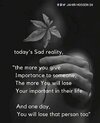D
Deleted member 14785
Guest
The end of a relationship can feel like an emotional earthquake, shattering the foundation of what was once familiar, safe, and full of promise. Breakups are not merely the end of companionship but the loss of a deeply embedded part of oneself. This essay explores the profound agony of breakups, delving into the complex stages of emotional pain, the often-paralyzing self-doubt that follows, and the long, painful journey toward healing.
In the aftermath of a breakup, the immediate feeling is often disbelief—a state of shock that numbs the mind and freezes time. The days blur together, and normal routines seem alien without the presence of the person who once defined them. The reality of waking up to an empty space, of no longer feeling the warmth of their voice or their laughter, sinks in slowly and painfully. As this realization takes hold, it is common to feel as though life itself has lost meaning.
Every memory of shared experiences replays vividly, almost cruelly, intensifying the ache. Each place, each song, each passing moment becomes a sharp reminder of what was lost. People often experience an overwhelming loneliness, as if part of themselves has been torn away, leaving a hollow void that they cannot fill.
As the initial shock subsides, many find themselves spiraling into deep self-doubt. Was it my fault? Could I have done something differently? These questions become an endless loop, gnawing at one’s self-worth and casting doubt on every choice made. Even the most confident individuals may find themselves haunted by insecurities they didn’t know existed. The person in the mirror feels unfamiliar, reflecting back not only the sadness but also a version of oneself that feels broken and unworthy.
Regret amplifies the pain, as people agonize over things said or unsaid, decisions made or avoided. It’s not unusual for people to fixate on every possible “what if,” imagining alternate paths where things turned out differently. The internal dialogue becomes relentless, making it challenging to move forward. The mind clings to the past, as if holding on tightly enough could somehow rewrite what has already happened.
Breakups are often felt as acutely in the body as in the mind. Studies have shown that the brain interprets the emotional pain of a breakup similarly to physical pain, triggering areas linked to physical distress. This pain can manifest as headaches, chest tightness, fatigue, and a loss of appetite. Nights are often the hardest—sleep becomes elusive as thoughts of the lost relationship invade even the moments meant for rest.
Over time, this physical toll compounds, leading to exhaustion. The body mirrors the soul’s weariness, feeling heavy, unmotivated, and almost lifeless. Even small tasks may seem impossible, as if the very act of living has become a burden without the companionship that once offered stability and comfort.
Letting go of someone you love can feel like an act of betrayal against your own heart. There’s a part of you that desperately clings to any shred of hope, a desire to hold on to even the smallest chance of reconciliation. Many people find themselves repeatedly reaching out to their ex-partner or revisiting memories in hopes of reawakening what has been lost. But this clinging, while natural, often deepens the wound, making the journey toward healing even more arduous.
At the same time, there’s an intense internal conflict between love and anger. Emotions can shift rapidly, and people often find themselves vacillating between missing their former partner and resenting them. This inner turmoil makes it hard to heal; every step forward feels like it is followed by two steps back, trapping people in a cycle that seems impossible to escape.
Healing from a breakup is neither linear nor easy. It is a journey that requires confronting one’s deepest fears, vulnerabilities, and insecurities. The process is often slow, with setbacks along the way. But amidst the pain, there are moments of clarity that come from looking within, exploring the reasons behind the relationship’s end, and facing uncomfortable truths about oneself.
One of the hardest parts of healing is learning to forgive—both oneself and the former partner. Forgiveness does not mean forgetting or condoning what happened; rather, it allows the heart to release the grip of bitterness and anger, freeing space for peace to take root. Forgiveness is a gradual process, and many people find that it comes in waves rather than a single epiphany.
In the depths of heartbreak, people also discover a kind of strength they never knew they had. The resilience required to endure such profound loss eventually fosters a newfound sense of self. This transformation is not immediate, but over time, individuals come to realize that they are more than the love they lost. Through the pain, they begin to rebuild, discovering pieces of themselves that had long been forgotten or neglected.
There is no definitive endpoint to healing from a breakup. Each person’s journey is unique, and the time it takes to heal varies widely. Some people may find solace in new relationships, while others find meaning in self-discovery and personal growth. In either case, the pain of a breakup eventually becomes a part of their story, shaping them into someone stronger, wiser, and more compassionate.
Breakups teach us the value of resilience, the power of letting go, and the beauty of rediscovering oneself. When the time comes to open the heart to love again, it is done with a deeper understanding of one’s worth and boundaries. The scars left by past heartbreaks do not disappear, but they transform into symbols of growth, reminders of the courage it took to face and survive such profound loss.
As people navigate the agony and rediscover themselves, they realize that even the darkest moments hold the potential for healing, renewal, and a deeper love for oneself. Ultimately, while the end of a relationship can bring unimaginable pain, it is also the beginning of a journey toward personal transformation.
In the aftermath of a breakup, the immediate feeling is often disbelief—a state of shock that numbs the mind and freezes time. The days blur together, and normal routines seem alien without the presence of the person who once defined them. The reality of waking up to an empty space, of no longer feeling the warmth of their voice or their laughter, sinks in slowly and painfully. As this realization takes hold, it is common to feel as though life itself has lost meaning.
Every memory of shared experiences replays vividly, almost cruelly, intensifying the ache. Each place, each song, each passing moment becomes a sharp reminder of what was lost. People often experience an overwhelming loneliness, as if part of themselves has been torn away, leaving a hollow void that they cannot fill.
As the initial shock subsides, many find themselves spiraling into deep self-doubt. Was it my fault? Could I have done something differently? These questions become an endless loop, gnawing at one’s self-worth and casting doubt on every choice made. Even the most confident individuals may find themselves haunted by insecurities they didn’t know existed. The person in the mirror feels unfamiliar, reflecting back not only the sadness but also a version of oneself that feels broken and unworthy.
Regret amplifies the pain, as people agonize over things said or unsaid, decisions made or avoided. It’s not unusual for people to fixate on every possible “what if,” imagining alternate paths where things turned out differently. The internal dialogue becomes relentless, making it challenging to move forward. The mind clings to the past, as if holding on tightly enough could somehow rewrite what has already happened.
Breakups are often felt as acutely in the body as in the mind. Studies have shown that the brain interprets the emotional pain of a breakup similarly to physical pain, triggering areas linked to physical distress. This pain can manifest as headaches, chest tightness, fatigue, and a loss of appetite. Nights are often the hardest—sleep becomes elusive as thoughts of the lost relationship invade even the moments meant for rest.
Over time, this physical toll compounds, leading to exhaustion. The body mirrors the soul’s weariness, feeling heavy, unmotivated, and almost lifeless. Even small tasks may seem impossible, as if the very act of living has become a burden without the companionship that once offered stability and comfort.
Letting go of someone you love can feel like an act of betrayal against your own heart. There’s a part of you that desperately clings to any shred of hope, a desire to hold on to even the smallest chance of reconciliation. Many people find themselves repeatedly reaching out to their ex-partner or revisiting memories in hopes of reawakening what has been lost. But this clinging, while natural, often deepens the wound, making the journey toward healing even more arduous.
At the same time, there’s an intense internal conflict between love and anger. Emotions can shift rapidly, and people often find themselves vacillating between missing their former partner and resenting them. This inner turmoil makes it hard to heal; every step forward feels like it is followed by two steps back, trapping people in a cycle that seems impossible to escape.
Healing from a breakup is neither linear nor easy. It is a journey that requires confronting one’s deepest fears, vulnerabilities, and insecurities. The process is often slow, with setbacks along the way. But amidst the pain, there are moments of clarity that come from looking within, exploring the reasons behind the relationship’s end, and facing uncomfortable truths about oneself.
One of the hardest parts of healing is learning to forgive—both oneself and the former partner. Forgiveness does not mean forgetting or condoning what happened; rather, it allows the heart to release the grip of bitterness and anger, freeing space for peace to take root. Forgiveness is a gradual process, and many people find that it comes in waves rather than a single epiphany.
In the depths of heartbreak, people also discover a kind of strength they never knew they had. The resilience required to endure such profound loss eventually fosters a newfound sense of self. This transformation is not immediate, but over time, individuals come to realize that they are more than the love they lost. Through the pain, they begin to rebuild, discovering pieces of themselves that had long been forgotten or neglected.
There is no definitive endpoint to healing from a breakup. Each person’s journey is unique, and the time it takes to heal varies widely. Some people may find solace in new relationships, while others find meaning in self-discovery and personal growth. In either case, the pain of a breakup eventually becomes a part of their story, shaping them into someone stronger, wiser, and more compassionate.
Breakups teach us the value of resilience, the power of letting go, and the beauty of rediscovering oneself. When the time comes to open the heart to love again, it is done with a deeper understanding of one’s worth and boundaries. The scars left by past heartbreaks do not disappear, but they transform into symbols of growth, reminders of the courage it took to face and survive such profound loss.
As people navigate the agony and rediscover themselves, they realize that even the darkest moments hold the potential for healing, renewal, and a deeper love for oneself. Ultimately, while the end of a relationship can bring unimaginable pain, it is also the beginning of a journey toward personal transformation.


 Don’t be sad hun......... Every problem can be fixed, as long as you have willpower and genuine love.......... time heals all wounds. xx
Don’t be sad hun......... Every problem can be fixed, as long as you have willpower and genuine love.......... time heals all wounds. xx 





